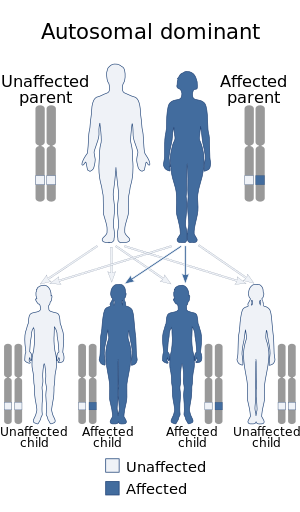Smith–Magenis syndrome
| Smith–Magenis syndrome | |
|---|---|
| Synonyms | 17p11.2 microdeletion syndrome |
 |
|
| Smith–Magenis syndrome is inherited in an autosomal dominant manner | |
| Classification and external resources | |
| Specialty | medical genetics |
| ICD-10 | Q93.5 |
| ICD-9-CM | 758.33 |
| OMIM | 182290 |
| DiseasesDB | 31737 |
| Orphanet | 819 |
Smith–Magenis Syndrome (SMS) is a genetic disorder affecting the whole body such as the brain. Features include intellectual disability, facial features such as a broad face, difficulty sleeping, and numerous behavioral problems such as self-harm. Smith–Magenis syndrome affects an estimated between 1 in 15,000 to 1 in 25,000 individuals.
It is a microdeletion syndrome characterized by an abnormality in the short (p) arm of chromosome 17 and is sometimes called the 17p- syndrome.
Facial features of children with Smith–Magenis syndrome include a broad face, deep-set eyes, large cheeks, and a prominent jaw, as well as a flat nose bridge. The mouth curves downwards and the upper lip curves outwards. These facial features become more noticeable as the individual ages.
Disrupted sleep patterns are characteristic of Smith–Magenis syndrome, typically beginning early in life. Affected people may be very sleepy during the day, but have trouble falling asleep and awaken several times each night, due to an inverted circadian rhythm of melatonin.
People with Smith–Magenis syndrome have engaging personalities, but all also have a lot of behavioral problems. These behavioral problems include frequent temper tantrums, meltdowns and outbursts, aggression, anger, fidgeting, compulsive behavior, anxiety, impulsiveness, and difficulty paying attention. Self-harm, including biting, hitting, head banging, and skin picking, is very common. Repetitive self-hugging is a behavioral trait that may be unique to Smith–Magenis syndrome. People with this condition may also compulsively lick their fingers and flip pages of books and magazines (a behavior known as "lick and flip"), as well as possessing an impressive ability to recall a wide range of small details about people or subject-specific trivia.
Other symptoms can include short stature, abnormal curvature of the spine (scoliosis), reduced sensitivity to pain and temperature, and a hoarse voice. Some people with this disorder have ear abnormalities that lead to hearing loss. Affected individuals may have eye abnormalities that cause nearsightedness (myopia), strabismus, and other problems with vision. Heart and kidney defects also have been reported in people with Smith–Magenis syndrome, though they are less common.
...
Wikipedia
